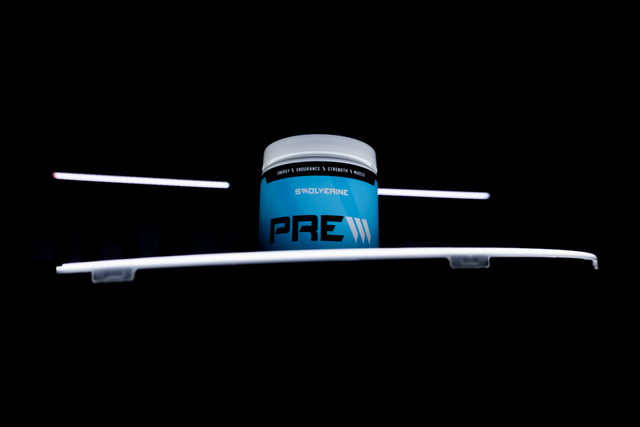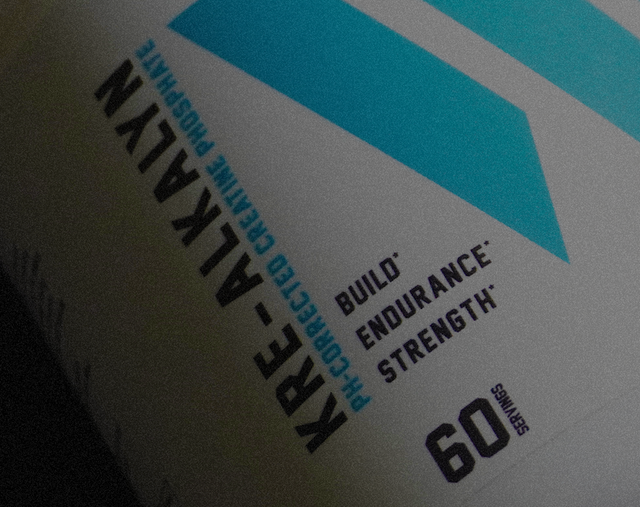In the dynamic world of fitness, women are breaking barriers and redefining strength, but there’s one powerhouse supplement quietly gaining traction in their routines: creatine. Often perceived as a tool reserved for bodybuilders and athletes, creatine is proving to be a game-changer for women looking to enhance performance, boost energy, and build lean muscle. Beyond the misconceptions, this remarkable compound offers surprising benefits that cater specifically to female fitness enthusiasts. Dive into the science behind creatine and discover how it can elevate your workouts, improve recovery, and even support cognitive function.
Join us as we unravel the untapped potential of creatine for women's fitness, empowering you to unleash your inner strength and achieve your goals.
Whether you’re lifting weights, running, or engaging in high-intensity training, the advantages of adding creatine to your regimen are hard to ignore—let's explore how you can harness its power for transformative results.
Unleashing Strength: The Surprising Benefits of Creatine for Women’s Fitness
Understanding Creatine: What It Is and How It Works
Creatine is a naturally occurring compound found primarily in muscle cells, where it helps produce energy during high-intensity activities such as weightlifting or sprinting. Synthesized from the amino acids arginine, glycine, and methionine, creatine is also present in dietary sources like red meat and seafood. For supplementation, creatine monohydrate is the most widely researched and effective form, known for its safety and efficacy across numerous studies (Kreider et al., 2017).
When supplemented, creatine increases phosphocreatine stores in the muscles. Phosphocreatine plays a vital role in regenerating adenosine triphosphate (ATP)—the body’s primary energy molecule. During intense exercise, ATP is rapidly depleted, and phosphocreatine helps replenish it, enabling sustained power and performance, especially in activities like sprinting, weightlifting, and high-intensity interval training (HIIT) (Buford et al., 2007).
Beyond energy production, creatine promotes cell volumization by drawing water into muscle cells, supporting muscle growth and fullness. Interestingly, it also offers neuroprotective benefits and has been shown to enhance cognitive performance in both sleep-deprived individuals and older adults (Avgerinos et al., 2018). This makes creatine a truly versatile supplement—not just for gym performance but for overall health and function.
The Science Behind Creatine and Muscle Growth
Creatine supports muscle growth through multiple physiological pathways. First and foremost, by boosting ATP availability, it enhances your capacity to lift heavier and train harder. This directly contributes to increased training volume, a critical driver of muscle hypertrophy (Kreider et al., 2017).
Another essential mechanism is its impact on muscle protein synthesis (MPS)—the process by which the body repairs and builds new muscle tissue. Supplementing with creatine has been shown to stimulate MPS, which is crucial for recovery and growth, particularly after strenuous workouts that cause microscopic muscle damage (Willoughby & Rosene, 2001).
Creatine also exerts influence on gene expression related to muscle adaptation. For example, studies have found that creatine supplementation can increase the expression of myogenic regulatory factors (MRFs), which are vital for muscle cell differentiation and growth (Safdar et al., 2008).
Additionally, creatine enhances the activation of satellite cells—specialized stem cells responsible for muscle repair and regeneration. Activated in response to resistance training, these cells are integral to the recovery and growth of muscle fibers. Research confirms that creatine can boost satellite cell activity, particularly when combined with progressive overload training (Olsen et al., 2006).
Why Women Should Consider Creatine
Despite misconceptions, creatine is not just for men or bodybuilders. Women, especially those engaging in strength training or high-intensity workouts, can benefit significantly. Clinical research shows that creatine can:
-
Increase strength and lean muscle mass without the "bulky" look (Smith-Ryan et al., 2021)
-
Improve endurance, recovery, and training performance
-
Support brain health, mood, and cognitive clarity—especially during PMS or perimenopause
-
Help retain lean muscle mass during calorie deficits or aging
And unlike stimulants, creatine provides consistent benefits without the crash or dependency. For women looking to get stronger, leaner, and healthier, it’s a powerful tool backed by science and real-world results.
Breaking Barriers: Myths and Benefits of Creatine for Women
Common Myths About Creatine and Women
Despite the well-documented benefits of creatine, many women are still hesitant to incorporate it into their routine due to persistent myths and misinformation.
Myth #1: Creatine Makes Women Look Bulky
A widespread misconception is that creatine will cause women to become bulky or overly muscular. In reality, women do not produce the same levels of testosterone as men, making it much harder to achieve the same degree of muscle hypertrophy. Instead, creatine helps women build lean muscle mass and enhance muscle tone and density, contributing to a stronger, more sculpted physique—not bulk (Volek et al., 1999).
Myth #2: Creatine Causes Bloating and Water Retention
Another prevalent concern is that creatine causes water retention and bloating. While it’s true that creatine draws water into muscle cells, this effect is intracellular—meaning it occurs within the muscles, not under the skin. This leads to improved muscle fullness and hydration, not puffiness. In most cases, any initial bloating is mild, temporary, and often resolves with proper hydration and adherence to dosing guidelines (Kreider et al., 2017).
Myth #3: Creatine Is Unsafe or Damaging to Kidneys
Safety concerns—particularly regarding kidney damage—are largely unfounded. Extensive research has shown that creatine is safe for long-term use in healthy individuals when taken at recommended dosages (Poortmans & Francaux, 2000). The myth likely stems from isolated case studies involving individuals with pre-existing kidney conditions or those consuming extremely high doses well beyond clinical recommendations.
Benefits of Creatine Supplementation for Women
Creatine offers a wide range of benefits that support both physical performance and overall health.
1. Increased Strength and Power
Creatine supplementation significantly enhances strength by increasing ATP availability during resistance training. This allows women to train harder, lift heavier, and progressively build more strength over time (Branch, 2003).
2. Improved Lean Muscle Mass
Contrary to the bulk myth, creatine supports lean muscle development without excessive size. It enhances muscle protein synthesis and promotes muscle fiber growth, helping women achieve a lean, defined physique that aligns with aesthetic and performance goals (Willoughby & Rosene, 2001).
3. Cognitive Enhancement
Creatine also provides brain-boosting benefits. By supporting ATP production in the brain, it helps improve short-term memory, reaction time, and cognitive clarity—especially in sleep-deprived or stressed individuals (Avgerinos et al., 2018). This makes creatine especially valuable for women balancing workouts, work, and daily responsibilities.
How Creatine Can Enhance Athletic Performance
Creatine isn't just for bodybuilders. Women in various sports can benefit from its performance-enhancing effects.
1. Better Endurance and Stamina
In endurance-based sports like running, cycling, or swimming, creatine helps prolong energy output by increasing phosphocreatine stores. This supports longer-lasting performance and delays fatigue during extended bouts of effort (Rawson & Volek, 2003).
2. Explosive Power for HIIT and Sprint Workouts
HIIT training and sprint-style workouts rely heavily on the ATP-PC energy system. Creatine boosts the efficiency of this energy pathway, allowing women to perform more reps, increase intensity, and push harder during high-effort intervals (Kreider et al., 2017).
3. Faster Recovery Between Workouts
Creatine has been shown to reduce muscle damage, inflammation, and oxidative stress post-exercise, enhancing recovery time and reducing soreness. This enables more frequent training, better adaptation, and a lower risk of overtraining injuries (Cooke et al., 2009).
Creatine and Recovery: What Women Need to Know
Supporting Faster, Smarter Recovery
Recovery is a crucial part of any fitness regimen, and creatine plays a key role in supporting the body's natural repair processes. One of the primary ways creatine aids recovery is by reducing muscle damage and inflammation that occur during intense workouts. Thanks to its antioxidant properties, creatine helps neutralize free radicals and lower oxidative stress in muscle tissue, resulting in less post-workout soreness and quicker recovery times (Sestili et al., 2011).
Glycogen Replenishment for Energy Restoration
Creatine has also been shown to enhance glycogen replenishment, which is critical after strenuous activity. Glycogen is the primary form of stored carbohydrate in the muscles and is essential for performance and energy. Studies have demonstrated that creatine supplementation increases the rate at which glycogen is restored after exercise, especially when taken alongside carbohydrates (Robinson et al., 1999).
Accelerating Muscle Repair and Growth
Another vital component of recovery is the repair and regeneration of muscle fibers. Creatine boosts muscle protein synthesis and activates satellite cells, both of which are essential for rebuilding muscle tissue after high-intensity workouts. This translates to faster recovery, better adaptation, and less downtime between sessions—ideal for women training multiple times per week (Olsen et al., 2006).
Dosage Recommendations and Best Practices for Women
How Much Creatine Should Women Take?
The standard, evidence-based approach to creatine supplementation includes two possible phases:
-
Loading Phase: Take 20 grams per day, split into four 5-gram servings, for 5–7 days.
-
Maintenance Phase: Follow with 3–5 grams per day to sustain saturation levels in muscle tissue.
However, the loading phase is optional. Some women may prefer starting with the maintenance dose right away, reaching full saturation within 3–4 weeks without the initial intensity. Both methods are equally effective in the long term (Kreider et al., 2017).
For best absorption, creatine should be consumed with a carbohydrate-rich meal or beverage, as insulin helps shuttle creatine into muscle cells. Hydration is key—since creatine pulls water into muscle cells, staying properly hydrated supports performance and reduces any potential side effects.
Choosing the Right Creatine Supplement
What’s Best: Monohydrate or Kre-Alkalyn?
The gold standard in research and results is creatine monohydrate—a highly bioavailable, cost-effective, and thoroughly tested form of creatine (Buford et al., 2007).
However, for women who experience bloating or digestive discomfort, Kre-Alkalyn® creatine may be a better choice. This buffered creatine has a higher pH level, which helps prevent breakdown into creatinine in the stomach. As a result, it may offer similar benefits with smaller doses and less gastrointestinal distress—making it a smart alternative for sensitive individuals (Jagim et al., 2012).
✅ Pro Tip: Look for creatine supplements that are third-party tested, free of fillers, and made by reputable companies that disclose ingredient sourcing and purity.
Potential Side Effects and Safety Considerations
Is Creatine Safe for Women?
Creatine is one of the most well-researched supplements available, with decades of clinical trials confirming its long-term safety when used as directed. Minor side effects, such as bloating, cramping, or upset stomach, are typically related to large doses, poor hydration, or low-quality products.
Kidney Function Concerns?
Creatine does not harm kidney function in healthy individuals. Concerns about kidney damage largely stem from misinterpreted early studies or isolated incidents involving individuals with pre-existing kidney issues (Poortmans & Francaux, 2000). If you have any medical conditions, especially involving renal health, consult your physician before starting supplementation.
Consistency Matters
For optimal results, creatine should be taken consistently—daily, not just on workout days. Skipping days or cycling on and off reduces the cumulative benefits. Whether you choose monohydrate or Kre-Alkalyn, consistency and hydration are key to maximizing effectiveness.
How to Integrate Creatine Into Your Routine
Adding creatine to your routine doesn’t have to be complicated—it’s about consistency and intention.
-
Timing: Take creatine daily, whether or not you’re training. You can take it pre- or post-workout, or with your biggest meal for optimal absorption.
-
Mixability: Kre-Alkalyn® comes in capsule form, so you don’t have to worry about mixing or chalky textures.
-
Hydration: Stay hydrated throughout the day to support performance, recovery, and comfort.
You don’t need to overhaul your lifestyle—just commit to showing up, fueling your body, and giving it the edge it deserves.
Why Swolverine? Built for Women, Owned by Women
At Swolverine, we believe women deserve science-backed supplements that actually work—without fillers, proprietary blends, or hype. That’s why we’ve formulated Kre-Alkalyn® Creatine, a pH-buffered creatine that delivers all the benefits without the bloat or discomfort.
💪 Woman-Owned, Performance-Driven: Swolverine is proudly woman-owned and operated, built by athletes and coaches who live what they preach. We’re here to help women lift heavy, feel strong, and fuel their goals—on their own terms.
✨ Whether you’re training for your first 5K, leveling up your strength in the gym, or just looking to feel like your most energized self—creatine can be a game-changer. And Swolverine is here to support every step of the way.
👉 Ready to see what creatine can do for you?
Check out Swolverine's Kre-Alkalyn® Creatine and elevate your strength, recovery, and results—without the side effects.
Or, if you're looking for personalized nutrition and fitness support, apply for 1:1 coaching through The Swole Kitchen.
Conclusion: Embracing Creatine for Empowered Fitness
Creatine supplementation offers a plethora of benefits that can significantly enhance women's fitness and overall health. From improved strength and power to enhanced muscle growth and recovery, creatine is a versatile and effective supplement that can help women achieve their fitness goals more efficiently. By dispelling common myths and understanding the science behind creatine, women can make informed decisions about incorporating this powerful supplement into their routines.
Whether you are a seasoned athlete, a fitness enthusiast, or just starting your fitness journey, creatine can provide the support you need to unleash your inner strength and achieve transformative results. By following proper dosage recommendations, choosing high-quality supplements, and staying consistent with your regimen, you can harness the power of creatine to elevate your workouts, improve recovery, and support cognitive function. Embrace creatine as a tool for empowered fitness and take your performance to new heights.
Find similar articles:
Supplements












